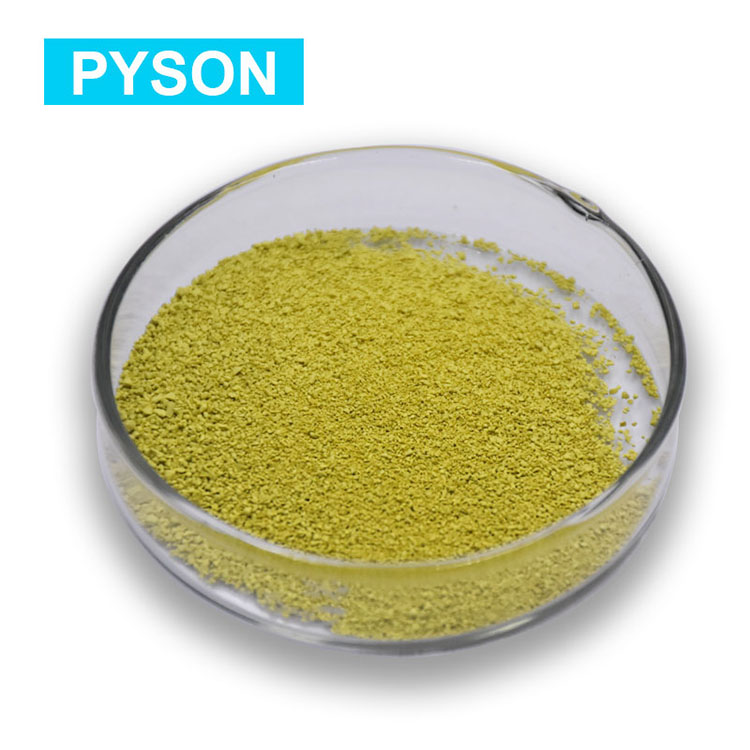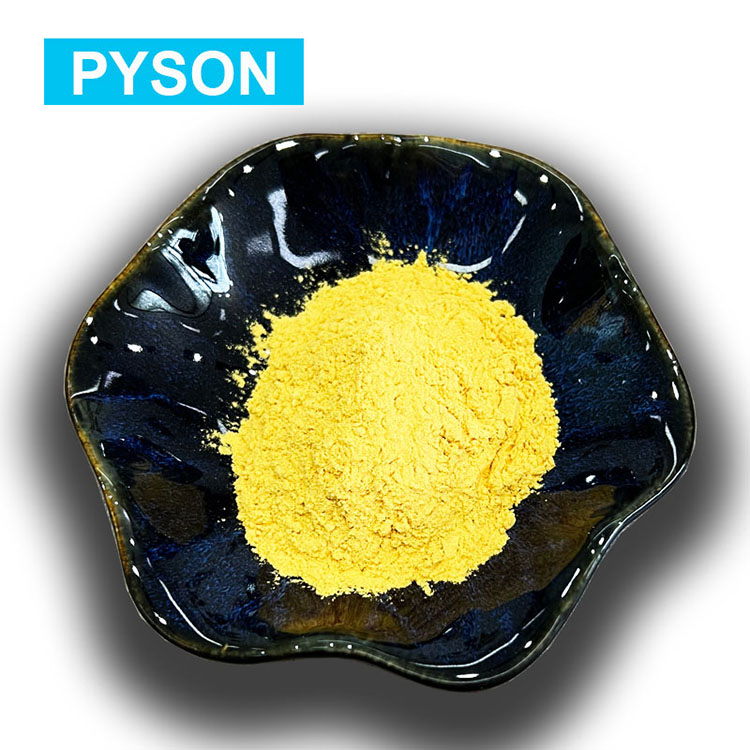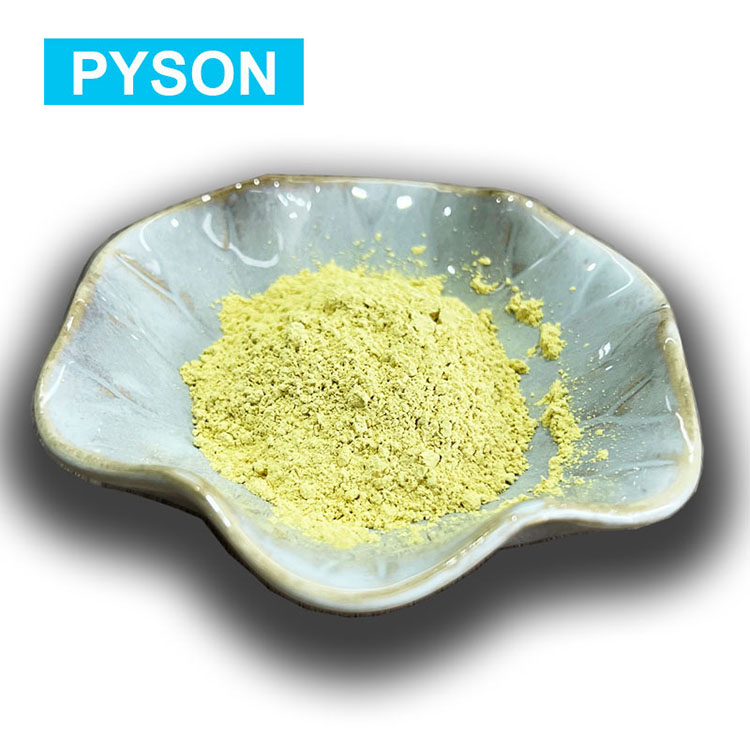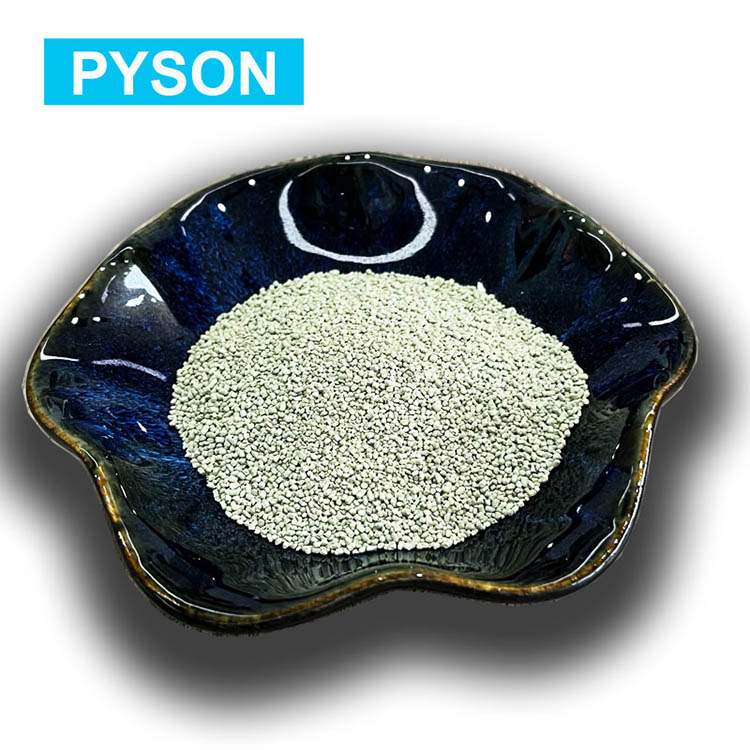
Rutin
- Pyson:
- Product Specification:
- Latin Name:
- Test Method:
- We're here to help:
Easy ways to get the answers you need.
1. Product Name: Rutin
English name: Rutin
Chinese alias: Vitamin P; Rutin,
Molecular weight: 610.518
Molecular formula: C27H30O16
Molecular Structure:

CAS Number: 117-39-5
Detection method: HPLC
Appearance: Light yellow or light green crystalline powder
Source: This product is derived from sophora japonica, rue leaves, tobacco leaves, dates, apricots, orange peels, tomatoes, buckwheat flowers, etc.
Specification:
Rutin powder 5% UV light yellow or light green crystalline powder
Rutin powder 90%UV light yellow or light green crystalline powder
Rutin granules 20 mesh light yellow or light green granules

2.product description:
Rutin, also known as rutin and vitamin P, with the molecular formula C27H30O16, is a natural flavonoid glycoside, which belongs to the flavonol glycosides widely present in plants. The two glycosides are glucose and rhamnose. Appearance is light yellow or light green crystalline powder. Soluble in pyridine, formyl and lye, slightly soluble in ethanol, acetone and ethyl acetate, almost insoluble in chloroform, ether, benzene, carbon disulfide and petroleum ether. Has anti-inflammatory, antioxidant, anti-allergic, anti-viral and other effects.

3.Flow chart:
1. Rutin exists in rutin leaves, tobacco leaves, orange peels, tomatoes, etc., and is especially rich in Sophora japonica rice and buckwheat flowers. The medicinal rutin in my country is extracted from Sophora japonica. After washing Sophora japonica, boil it with hot water and lime milk (adjust pH to 7.5-8) for 20min, add borax, keep at 95-100℃ for half an hour, filter while hot, and adjust the filtrate to pH=6- with hydrochloric acid 7. Cool to below 30°C, stand for precipitation, and separate to obtain crude rutin, which is dissolved, recrystallized and dried to obtain the finished product. The total yield is 8.3% based on Sophora japonica rice.
2. After crushing the raw material (usually using Sophora japonica bud), extract it with hot ethanol, and then crystallization and refining with ether, hot methanol and hot water for many times. The residue obtained after the extract is concentrated, and other impurities such as soluble pigments are removed with a solvent, and then ethanol, ether, hot methanol and hot water are repeatedly crystallized and purified by activated carbon to obtain high-purity products.
Storage:Food-grade plastic bags wrapped in kraft paper bags, or sealed in glass bottles. Store in a cool dry place. Do not store with toxic chemicals.

4.Function:
1. Anti-free radical effect.
2. Anti-lipid peroxidation.
3. Antagonize the role of platelet activating factor.
4. Anti-acute pancreatitis.

5.Application:
1. It can be used as edible antioxidant and nutritional enhancer.
2. It has anti-inflammatory effect, can reduce the inflammation caused by mustard oil on animal eyes or skin, and has anti-viral effect.
3. It has the functions of maintaining vascular resistance, reducing its permeability and reducing fragility. It can be used to prevent and treat cerebral hemorrhage, hypertension, retinal hemorrhage, purpura and acute hemorrhagic nephritis.

-

Soluble Mulberry Leaf Extract Sodium Copper Chlorophyllin Powder
Sodium Copper Chlorophyllin …
-

Pyson Supply Pure Quality Goji Berry Oil Wolfberry Oil
Pyson Supply Pure Quality Goji Berry Oil Wolfberry Oil Product Name Wolfberry Oil Appearance Light yellow clarifies the liquid Extr…
-

Fisetin
Appearance: This product is yellow needle crystal; (dilute ethanol), melting point 330℃ (decomposition).…
Copyright © 2022-2023 http://www.pyson.cn. All Rights Reserved PYSON Co.,Ltd.版权所有
* The statements on the website have not been evaluated by the Food and Drug Administration. These products are not intended to diagnose, treat, cure or prevent any disease.
 info@pyson.cn
info@pyson.cn
 +86-13088956689
+86-13088956689








 Send Email
Send Email

 Get Price
Get Price
 INQUIRY
INQUIRY




